高英ppt
高级英语第二册课件PPt,教材
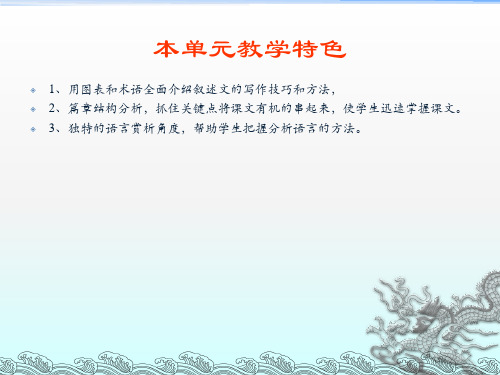
( magazine + catalog) 杂志目录
Blends
comint ( communications + intelligence) 通讯情报
reasons to stay
1. He is a self-employed businessman Magna product -- the name of his company implication: How great the loss it would be if the house was destroyed. 2. His present house was in a better condition than his former house.
2. To be acquainted with some literary terms
3. To learn to use words to describe disasters and violence
4. To appreciate the language features 5. To learn to write a story about disasters.
dust which moves in a relatively narrow path can be devastating in its destructiveness.*image-1* cyclone -- a vortex, usually hundreds of miles in diameter*image-2*
高英第九课MirrorofAmerica课件

该作品的作者生平对于理解Mirror of America的创作背景非常重要,
需要了解作者的生平、创作理念以及与作品相关的个人经历。
03
Mirror of America内容解析
主题思想
主题思想
该文通过描述美国社会现象,揭示了美国文化的多元性 和开放性,同时也探讨了全球化对美国文化的影响。
主题思想分析
Mirror of America的创作背景
01
20世纪初的美国社会背景
Mirror of America创作于20世纪初,当时美国正经历着社会和文化的
巨变。
02
现代主义思潮的影响
Mirror of America体现了现代主义思潮的影响,强调个体经验、非理
性、自由联想和反传统等观念。
03
作者的生平与创作理念
高英第九课Mirror of America课件
目录
• 引言 • Mirror of America背景介绍 • Mirror of America内容解析 • 教学方法与技巧 • 课程实践与应用 • 总结与展望
01
引言
课程简介
01 课程名称
Mirror of America
02 适用对象
高中生及大学生
教师可以让学生扮演课文中的角色, 通过模拟对话或情境表演来加深对 课文的理解。
课堂展示
教师可以让学生准备PPT或其他形 式的展示,向全班同学介绍与课文 相关的内容,提高他们的自主学习 能力。
学习评估与反馈
课堂表现评估
教师需要观察学生在课堂上的表 现,包括他们的参与度、回答问 题的准确性和语言表达等,以便
写作素材
课件提供了丰富的写作素材,包括历史事件、文化背景和社会现象 等,帮助学生拓展写作思路和内容。
高级英语 ppt课件

ppt课件
7
The key points of paragraph 29-42
• The climax of the trail:
• Darrow vs.
Bryan
• The sun was created the 4th day, why there was morning & evening on the 1st day?
ppt课件
6
The key points of paragraph 29
• More than 200 spectators sat…or squatted on the grass, perched on the tops of…or gawked from windows.
• squat: crouch so as to sit on the heels with the knees bent and the weight resting on the balls of the feet
• The punishment of the serpent by God
• How did the snake go before the punishment?
• The acceptance of Darrow’s idea by the spectators: shaking hands with him
ppt课件
9
The end of the text: the last 2 paras.
• 1. The narrator: • Going to Chicago to pursue the study
• perch: rest, stand or sit on some elevated place, usually referring to birds .
高英第2课PPT课件
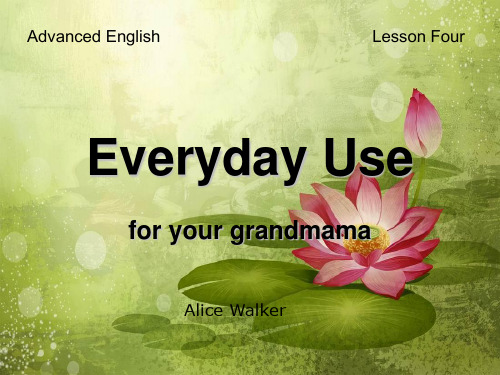
*
11
Theme
• The story praises the simplicity of Maggie and her mother, along with their allegiance (忠诚) to their specific family identity (身份) and folk heritage (民族传统) as well as their refusal to change at the whim (一时的 兴致) of an outside world that doesn’t really have much to do with them.
*
5
Homework
• (2-2) Words and Expressions: • Ex IV (Word replacement) • Ex IX (crop, put, keep, bring, hang, hand,
style, stick, carry) • Ex XII (C-E translation)
*
3
Homework
• (1) Reading Comprehension: • Ex I (Questions) • Ex II (Paraphrase) • Ex III (E-C translation)
*
4
Homework
• (2-1) Words and Expressions: • Refer to “word list.doc”
*
12
Theme
• “Everyday Use”, a story addresses itself to (针对…而写) the dilemma of African Americans who,
高级英语课程第二册-精品.ppt
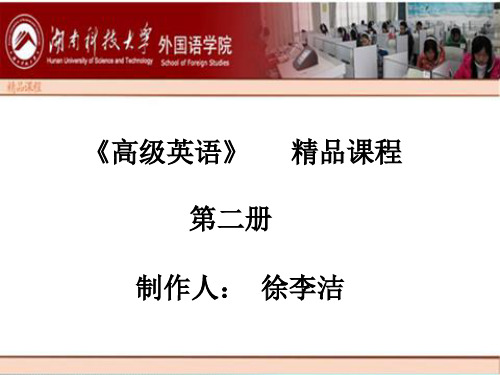
2. Differences
Human language dualitபைடு நூலகம் (双重性) structure of sounds & meanings productivity (创造性)
a speaker’s ability to string together discrete units to form an infinite set of “well-formed” novel sentences displacement (位移性) refer to things which are not present; real or imagined in the past, present, future, in far away places interchangeability (替换性) both a producer and a receiver, all
King’s English—Supposedly correct or standard English (Especially British English) as to grammar and pronunciation. Or Queen’s English
RP—Received Pronunciation
--symbolic: words are associated with objects, actions and ideas by conventions.
--vocal: the primary medium is sound for all languages, no matter how well developed are their writing systems.
--system: elements are arranged according to certain rules, can be learned and used consistently.
高英ppt

Negative words
• “unsay no word, nothing will turn us…, never parley, never negotiate, no class war, without distinction of race…,no time to moralise, no more than a prelude, no doubt” … • Such language, with a strong "absolute" sense, can erase all wandering and all doubts both possible and impossible ,both reasonable and unreasonable. Thus, the strong forcefulness and impression has come out with the language
XIV. Topics for oral work Comments on Churchill’s Speech
08英本二班 08英本二班 史茜 杨彦霞 21 号 22 号
1. Sound and good reason 2. Intense emotion
3. Powerful language Rethorical devices Vivid decription A clear stand The first person Negative words
Rheorical devices
Declare Britain’s policy
• “We are resolved to destory Hitler and every vestige of the Nazi regime.” “Any man or state… will have our aid” (This claim implies…) “Any man or state… is our foe”
高英ppt
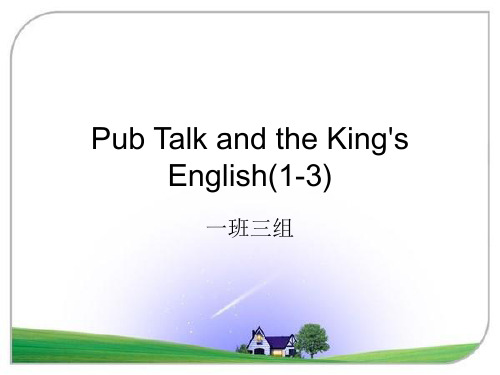
paragraph 3
• The real thesis: • Bar conversation has a charm of its own
• Why does the writer like bar conversation so much?
• 1、The writer’s upbringing in English pubs.
having many complexly arranged elements; elaborate 错综复杂的
• Animals can communicate with each other with their voice, facial expressions and body movementstoinaallovweyryoucrosemlfptolichaatveedawndayo,r bduotstthhe communicatiotnhatthyeoyulliikke,ceasnp’ecitabllyescthaltlheadt is conversaticoonn.sidered bad for you. 沉湎 沉迷, 沉溺
It was an ancient superstition that it was unlucky to set the left foot on the ground first
on getting out of bed.
They are like the musketeers of Dumas.
于….
paragraph 2
1.The charm of conversation is that it does not really start from anywhere, and no one has any idea where it will go as it meanders or leaps and sparkles or just glows.
高英第13课课件
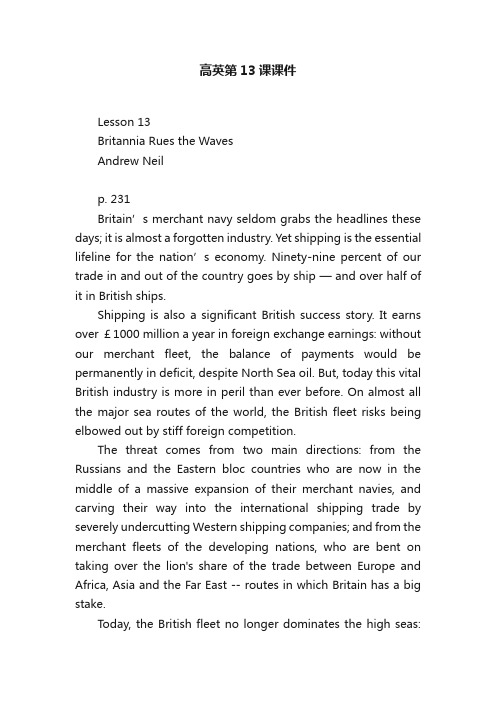
高英第13课课件Lesson 13Britannia Rues the WavesAndrew Neilp. 231Britain’s merchant navy seldom grabs the headlines these days; it is almost a forgotten industry. Yet shipping is the essential lifeline for the nation’s economy. Ninety-nine percent of our trade in and out of the country goes by ship — and over half of it in British ships.Shipping is also a significant British success story. It earns over £1000 million a year in foreign exchange earnings: without our merchant fleet, the balance of payments would be permanently in deficit, despite North Sea oil. But, today this vital British industry is more in peril than ever before. On almost all the major sea routes of the world, the British fleet risks being elbowed out by stiff foreign competition.The threat comes from two main directions: from the Russians and the Eastern bloc countries who are now in the middle of a massive expansion of their merchant navies, and carving their way into the international shipping trade by severely undercutting Western shipping companies; and from the merchant fleets of the developing nations, who are bent on taking over the lion's share of the trade between Europe and Africa, Asia and the Far East -- routes in which Britain has a big stake.Today, the British fleet no longer dominates the high seas:our share of the world's merchant fleet has fallen from 40 per cent to around eight per cent. But, in terms of tonnage, the British merchant navy has continued to expand, it can now carry over two-thirds more than it could in 1914, and, almost alone among our traditional industries, shipping has remained a major success story.Unlike the rest of British industry, ship-owners invested big. In the early 1960s, the shipping companies cashed in on government grants and tax concessions. Between 1966 and 1976, British shipping lines invested at a rate of over £1 million a day. By the early 1970s, it seemed that, somewhere in the world, a new British ship was being launched every week. The result is that Britain has a very modern fleet: the average age of our merchant ships is only six years, and over half the fleet is under five years old. For some time now, British shipping managers have stayed ahead of the competition by investing in the most sophisticated ships.The other major factor which has played a key role in the dominance of the British merchant navy is an institution invented by the British well over 100 years ago: the "conference".In the middle of the 19th century, competition between sailing-ships and steamships became cutthroat, and price cutting ruined many long-established companies. So the ship owners got together to establish a more settled system, and they set up a system of price fixing. In other words, every possible type of cargo had a price, which all owners agreed to charge. It was, in fact, a cartel, though the British ship owners gave it the more dignified name of a "conference". The system has certainly stood the test of time. Today, there are about 300 conferences governing the trade-routes of the world,and the British still play a major role.By reducing competition, shipping conferences have taken some of the risk out of the dodgy business of moving goods by sea. They make it harder, perhaps, to make a big killing in good times, because you have to share the trade with other conference members. But they make it easier to weather the bad times, because there is no mad, competitive scramble for the available trade.By the early 1970s, bad times were just around the corner. The world shipbuilding boom reached its peak in 1973, but that was the year of the Arab-Israeli war, which was followed rapidly by the quadrupling of oil prices. By 1974, the industrialised world had begun its slide into the worst depression since the 1980s, and the shipping industry had entered its long years of crisis.The first to be affected were the oil-tanker fleets. As oil demand was cut back, charter rates plummeted, and the estuaries of the world became jammed with the steadily increasing numbers of mothball tankers. Norway and Greece suffered most. British ship owners had not become so involved in the tanker boom in the first place, so they were not so badly affected. By 1976, the slump had begun to bite into the bulk carrier trade. Bulk carriers are ships that carry dry cargo of one particular kind, such as sugar, coal or wheat, with iron ore being by far the most important. But with the world steel industry deep in the doldrums, who needed iron ore carriers? With its big bulk-carrier fleet, the British shipping industry now began to feel the pinch.Britannia ( n.) [poetic] Great Britain [诗]大不列颠rue ( v.) repent of;regret having entered into懊悔;抱憾Britannia Rues the Waves is a parody of Britain's proud boast, "Britannia Rules the Waves", a song much sung and played in the British Navy.industry ①Commercial production and sale of goods.产业,工业:商业性生产和货物销售②A specific branch of manufacture and trade 行业,制造业或商业的分支success storyan account of the achievement of success by someone or some enterprise; a person or thing that is very successful foreign exchange①Transaction of international monetary business, as between governments or businesses of different countries.国际汇兑:各国政府或商行间的国际金融业务交易②Negotiable bills drawn in one country to be paid in another country.外汇deficit ( n.) the amount by which a sum of money is less than the required amount亏损;赤字peril ( n.) exposure to harm or injury;danger (严重的)危险;冒险bloca group of countries in special allianceundercut (v.) sell at lower prices or work at lower wages than比以别人低的价格出售be bent on (doing) sth.be determined on 决心the lion's sharethe largest or best part of sth.when it isdivided最大最好的一份stakea share or an interest in an enterprise 股份:指企业的股份high seasThe open waters of an ocean beyond the limits of the territorial jurisdiction of a country 公海:一国领土管辖权以外的海洋的公共水域tonnage ( n.)the total amount of shipping of a country or port,calculated in tons (一国或一港口的)船舶总吨数cash in on sthtake advantage of or profit from sth.获得利益或利润tax concessionsa right or privilege granted by the government to be tax exempt(免除)launchTo put (a boat) into the water in readiness for use. 下水:使(船)下水以备使用institutionAn established organization or foundation, especially one dedicated to education, public service, or culture. 机构,组织或基金,特别是指为教育,公共服务或文化的目的而设立的机构sailing shiplarge wind-powered vesselcartel [kɑ:'tel] ( n.) an association of industrialists,business firms. etc.for establishing a national or international monopoly by price fixing 卡特尔,同业联盟dodgy ( adj.) unstable, unreliable不可靠的:不稳定的scramble ( n.) rough struggle;a disorderly struggle or rush 争夺,抢夺quadruple ['kw?drupl] ( v.) make or become four times as much or as many;multiply by four (使)成四倍depressiona protracted period in which business activity is far below normal and the pessimism of business and consumers is great.charterThe hiring of an aircraft, a vessel, or other vehicle 包租,包船,包机:出租飞机、轮船或其他交通工具plummet ( v.) drop drastically骤然跌落estuary ['estju?ri] ( n.) the wide part of a river where it nears the sea (江河入海的)河口mothball ( n.)① small ball of chemical pesticide used when storing clothing樟脑丸②the state of being stored,or kept in existence but not used封存保藏A tank ship, often referred to as a tanker, is a ship designed to transport liquids in bulk.slump ( n.) a decline in business activity,price,etc.(物价等)暴跌;(市场等)萧条Bulk cargo is commodity cargo that is transported unpackaged in large quantities. Bulk cargos are classified asliquid or dry.dry cargocommodities that are not liquidsdoldrums ['d?ldr?mz] ( n.) low spirits;dull,gloomy feeling 情绪低落,意志消沉;忧郁pinch ( n.) a painful,difficult circumstance困苦的处境,贫困的境地p. 234Even though the slump spread fast into most shipping sectors, the British fleet was still a long way from bankruptcy. The one area which has weathered the economic storms best is that controlled by the conferences: the scheduled freight-liner services -- and that is where Britain's fleet is strongly entrenched.Liner-freight vessels offer people who want to sendgoods by sea a regular, scheduled shipping service; they follow agreed routes, or‘lines’, and call at ports on agreed dates. For example, if I want to send a shipment of spare tractor parts from Taiwan to Bangkok, all I have to do is contact the Far East Freight Conference, and that will be able to tell me when the next liner ship will be calling at Taiwan, the exact date on which it will get to Bangkok, and the going freight rate. It is an ideal 'parcel' service for people with cargoes that are not big enough to make it worth chartering a whole ship.It is also a plus for the ship owners not to be dependent on only one customer. Liner ships carry all sorts of different cargoes -- mainly finished manufactured goods -- so, if there is a slump in one particular industry, provided there is still buoyancy in other industries, the liner fleets can still survive. That gives them a distinct advantage over oil tankers or bulk carriers, because thelatter are dependent on one or two basic raw materials. That is why Britain has remained relatively strong.Much of Britain's liner fleet rarely sees a British port. Our ships are extensive cross-traders; that is, they carry goods between foreign countries. British companies are big, for example, on the Japan-to-Australia run, and on the growing trade routes between the Far East and the Middle East, around the Persian Gulf. Until recently, those routes were highly profitable for the British companies, and a major source of foreign currency for Britain. They are also the routes on which the Third World and the Russians are out to make the biggest inroads.Most emerging countries in the Third World are out to carry a bigger share of their trade in their own ships. Developing countries regard a merchant navy as something of a status symbol -- the next thing to go for after a national airline. Singapore has expanded their fleet by 6000 percent in the last 15 years, India by 400 percent.The challenge from the Third World has always been foreseen by our shipping companies. P & O, for example, while still out to increase the total freight it carries, is planning for a gradual reduction in its percentage share of the trade with the new shipping powers of the Third World. But P & O has no intention of throwing in the towel. The key tactic behind its strategy of holding on to the richest slice of the trade has been to move up-market -- to go where the Third World cannot follow: into high-technology investment.Containers, for example, were an American invention, but it was British ship owners who put up the money to pioneer the international deep-sea container service. Containers save time, because the loading is done in the factory or warehouse, ratherthan on the dockside, and they are very secure against theft; except for a code number on the outside, there is no indication of what is inside the box. T o cash in on the container revolution, you need a sophisticated system of roads and railways, something that most Third World countries do not have: And container ships are expensive, around £50 million each.P & O's high-technology, high-investment strategy, however, is far from being the whole answer to the Third World threat. The developing countries are not out to compete with Western fleets by commercial means; they want to impose a set of rules which will guarantee them a major slice of the shipping trade. This demand has found official expression in the United Nations Conference on Trade and Development, UNCTAD. The UNCTAD liner code lays down that between two trading partners, 80 per cent of the freight should be split equally between their respective merchant fleets. That leaves only 20 per cent to go into the numerous cross-traders, all fighting for a share, and it is on these cross-trades that British liner companies earn 40 per cent of their revenue. Not enough countries have ratified the UNCTAD code yet to bring it into force. But if it does become universal, it could strike a severe blow to Britain's liner trade.The Iron Curtain countries represent an even greater and more organised threat to the future of Britain's liner ships, and it is a threat that is much more difficult to counter.Russia has expanded its cargo-liner fleet far faster than the growth in either its own trade or world trade would justify. Today, it has the largest liner fleet in the world and another one million tons should come into service before 1980. And with its policy of excessively low freight rates, the Russian merchant navy hasalready made major inroads into Western trade.Russia now carries 95 per cent of its sea-borne trade with the EEC in its own ships. More important, it is biting deeply into the major cross-trading routes of the world. Eastern bloc countries -- Russia, with Poland and East Germany -- have already captured 20 per cent of the cargo traffic on the busy sea-lanes of the North Atlantic, almost 25 per cent of the trade between Europe and South America and just about the same percentage of the trade between Europe and East Africa.entrench [in'trent?] ( v.) establish securely 确保(地位等)going adj. Current; prevailing 现行的;流行的plusa favorable condition or factor 有利的情况或因素buoyancy ( n.) the property (as of price or business activity) of maintaining a satisfactory high level (物价)上涨的趋向;(生意)兴盛的趋向be out to attempt toinroad (usu.pl.) injurious intrusion on or into (通常为复数)损害,侵蚀something ofTo some extent 在某种程度上go forInformal To have a special liking for 爱好:对…特别喜欢, 努力获取Peninsular and Oriental Steam Navigation Company, a British shipping company founded in 1837throw in the toweladmit that one is defeated承认失败,认输tactican expedient (权宜之计) for achieving a goal; a maneuver.战术:为达到一个目标所采取的一项应急措施;一种策略strategyscience and art of using all the forces of a nation to execute approved plans as effectively as possible during peace or war. 战略:在和平或战争时期尽可能有效地利用一国的全部力量去实施核准的计划的科学与艺术container shipa cargo vessel specially designed and built for the carriage of cargo prepacked in containers.UNCTAD ['?nkt?d]United Nations Conference on Trade and Development, set up in 1964. UNCTAD is concerned with the fundamental problems affecting the trade of developing countries. It has its headquarters in Geneva.联合国贸易及发展会议revenue ['revinju:]n. the entire amount of income before any deductions are made总收入; 财政收入, 税收ratify v. approve and express assent 批准, 认可linerAn ocean liner is a ship designed to transport people from one seaport to another along regular long-distance maritime routes according to a schedule.Iron Curtain symbolized the ideological boundary dividing Europe into two separate areas from the end of World War II in 1945 until the end of the Cold War in 1991. On either side of the Iron Curtain, states developed their own international economic and military alliances:柏林墙EEC European Economic Community.p.237How can the Russians afford to undercut by up to 40 percent? Well, Soviet ships are not necessarily out to make a profit, in our sense of the word. The name of the game, for Russian ships, is hard currency. The Soviet Union is becoming more dependent on Western imports -- from grain to technology -- but the West will not accept roubles in payment. So Russia needs hard currencies, like the dollar, the mark or the yen, even sterling, to pay for its imports. It is these currencies Russian ships earn as cross-traders. It does not matter very much if they are operating at a loss; that can be made up by the Soviet government in roubles.But there is more to it than that for the Russians. The Soviet mercantile marine obviously acts as a support to the Soviet navy, very much as Western fleets used to do. But there are important differences. The Soviet merchant fleet, which has now been almost 20 years in growing, has developed the kinds of ships which would certainly expand the Soviet reach well beyond its perimeters. For example, much of the heavy equipment for theCubans and Angolans was brought in Soviet merchant ships. So this mercantile marine capability is certainly a great advance in the Soviet ability to project their power at some distance from their own frontiers.And this is also part of a general Soviet hydrographic policy to map the oceans of the world, to get to know the ports and, above all, to deepen contacts with the states with whom the Russians are developing close trading ties.How can Western ship owners react to undercutting of 40 per cent that would drive them out of business if they did the same?There is a limit, of course, to what any British government can do on its own. Shipping is an essentially international business, and Britain can only counter the challenges of the developing world and the Russians at an international level. But whom could we count on for support? The EEC is so divided about shipping that it is almost powerless to act. Take the challenge of the developing world. The French do not mind the UNCTAD code on liner shipping because it would help them to increase their share of the liner trade; the same is true for the Germans and the Belgians. So Britain cannot rely on concerted EEC action on that issue. As far as the Russians are concerned, Britain, along with West Germany and Denmark, has been calling for a coordinated response; the monitoring of Russian ship movements and restrictions on the number of Russian ships allowed to call at EEC ports. But, last June, the French, because of their Russian ties, blocked plans along these lines. It will be November before the question is considered again.British ship owners are so far happy with the strength of theBritish government attempts to force the EEC into action. They believe that the Trade Department, which looks after shipping, understands their problems. But they are far less sure about other government ministers, especially those in the powerful Industry Department, which oversees shipbuilding. Ship owners fear that saving jobs in Britain's ailing shipyards comes well before saving its merchant fleet.British shipyards are currently churning out 24 vessels for Poland. The Poles were lured to Britain by the gift of a£28 million subsidy and the promise that British shipbuilders would raise all the credit; so while our shipping fleet is under attack from communist ships, our government is using British taxpayers' money to cut their shipbuilding costs. We are doing the same for developing countries' fleets. India is now a major Third World shipping power, yet Britain is to build six ships for the Indians -- for nothing.In the end, British companies could be driven out of shipping altogether. Some, such as P & O, have already moved into other fields, from house building to oil. Smaller shipping lines do not have the resources to diversify. They face extinction. And when they go, so does a huge slice of the few traditional industries worth keeping.(from The Listener, August, 1978)up to as many asname of the game n. Slang The essential or indispensablepart or quality necessary for success of an activity or the fulfillment of a goal 事情的要点:为了某项活动或事业的成功基本的或必需的部分或特性hard currency n. 硬通货(货币)rouble ( n.) the monetary of the Soviet Union卢布(苏联货币单位)sterling ( n.) British money英国货币mercantile ['m?:k?ntail] ( adj. ) of merchants or trade;commercial商人的;贸易的;商业的perimeter [p?'rimit?] ( n.) the outer boundary of a figure or area;circumference周边;周围hydrographic [.haidr?u'gr?fik] ( adj.) of the study,description,and mapping of oceans,lakes,and rivers 水文学的,水文地理学的on one’s ownadv. 独自地, 独立地, 主动地concerted [k?n's?:tid]Planned or accomplished together 共同计划或完成的We made a concerted effort to solve the problem.我们一起努力解决了这个问题coordinate v. bring into common action 协调, 整合; 使一致blockTo stop or impede the passage of or movement through; obstruct妨碍,阻止;阻碍DepartmentA principal administrative division of a government政府部门:政府主要的行政部门shipyardA yard where ships are built or repaired船坞,建造或修理船只的工场, 造船厂;修船厂ailing (adj.) in poor health;sickly患病的churn outproduce a large quantity of sth.; produce in quantity without quality 大量生产出;大量地粗制滥造subsidymonetary assistance granted by a government to a person or group in support of an enterprise regarded as being in the public interest. 补助金:政府给予个人或团体被看作是有益于公众的事业的津贴diversify v.To spread out activities or investments, especially in business. 多样化:尤指在商业中从事多种活动或投资NOTES1) Britannia Rues the Waves: This is a parody of Britain's proud boast, "Britannia Rules the Waves"."Rule, Britannia" is a famous naval song much sung and played in the British Navy from the date of its first performance in 1740 to the present day, and generally recognized today as the official march of the Royal Navy. It was written by James Thomson and set to music by Dr. Thomas Arne (1740). The song runs like this:When Britain first, at Heaven's command,Arose from out the azure main,This was the charter of her land,And guardian angels sang the strain:Rule, Britannia! Britannia, rules the waves!Britons never shall be slaves.The author means that today, instead of ruling the waves, Britain is sorry that it has lost its dominance on the high seas.2) Andrew Neil: writing on industrial and labour affairs for the ‘Economist'3) North Sea Oil: oil produced from the British sector of the Continental Shelf under the North Sea. Oil was first discovered under the bed of the North Sea in 1970 and production began in 1975.4) tax concessions: a right or privilege granted by the government to be tax exempt5) depression: a protracted period in which business activity is far below normal and the pessimism of business and consumers is great. It is characterized by a sharp curtailment of production, little capital investment, a contraction of credit, mass unemployment and low employment, and a very high rate of business failures.6) doldrums: the belt of calm which lies inside the trade winds of the northern and southern hemisphere. This area, which lies close to the equator except in the western Pacific where it is south of the equator, had great significance during those years when the trade of the world was carried by sailing ships. The term is also used to signify a state of depression or stagnation, an analogy of the general depression of the crews of ships lying motionless while in the areas of the doldrums, unable to find wind to fill their sails.7) dry cargo: commodities that are not liquids8) liner: a ship belonging to a shipping company whichcarries passengers on scheduled routes. A cargo liner is a cargo-carrying vessel with accommodation for a few passengers.9) P & O: Peninsular and Oriental Steam Navigation Company, founded in 1840, world-wide passenger service10) container ship: a cargo vessel specially designed and built for the carriage of cargo prepacked in containers. With a standardized size of container, holding 18 tons of cargo, holds and deck spaces can be designed exactly to accommodate containers, leading to greater ease and efficiency in stowage and the eradication of much of the danger of the cargo shifting during heavy weather at sea.11) UNCTAD: United Nations Conference on Trade and Development, set up as an organ of the UN General Assembly by a resolution of December 1964. UNCTAD is concerned with the fundamental problems affecting the trade of developing countries. It has its headquarters in Geneva.12) Iron Curtain: referring to the Soviet Union and the eastern European countries in the capitalist press, first used by Churchill in his speech at Fulton, Missouri, 5 March 1946: "From Stettin in the Baltic to Trieste in the Adriatic an iron curtain has descended across the Continent. "13) EEC: European Economic Community, established by treaty signed at Rome March 25, 1957, effective January 1, 1958. EEC headquarters are in Brussels and it comprises a Council of Ministers, an executive Commission, and the Assembly and Court of Justice词汇(Vocabulary)Britannia ( n.) :[poetic]Great Britain or the British Islands[诗]大不列颠;不列颠群岛rue ( v.) :repent of;regret having entered into:wish nonexistent懊悔;抱憾deficit ( n.) :the amount by which a sum of money is less than the required amount亏空,亏损;赤字peril ( n.) :exposure to harm or injury;danger;jeopardy (严重的)危险;冒险undercut (v.) :sell goods more cheaply or work for smaller wages than(sb.doing the same);sell at lower prices or work at lower wages than比以别人低的价格出售(商品);索价低于他人tonnage ( n.) :the total amount of shipping of a country or port,calculated in tons(一国或一港口的)船舶总吨数cartel ( n.) :an association of industrialists,business firms. etc.for establishing a national or international monopoly by price fixing,ownership of controlling stock,etc.[经]卡特尔dodgy ( adj.) :[BrE] risky and possibly dangerous[英]冒险的;危险的scramble ( n.) :rough struggle;a disorderly struggle or rush 争夺,抢夺quadruple ( v.) :make or become four times as much or as many;multiply by four(使)成四倍;以四乘plummet ( v.) :drop drastically垂直落下;骤然跌落estuary ( n.) :an inlet or arm of the sea;the wide mouth of a river where the tide meets the current(江河人海的)河口,港湾moth-ball ( n.) :①marble-sized balls of naphthalene. stored with clothes (esp.woolens)to repel moths;②the state of being stored,or kept in existence but not used①樟脑丸;卫生球②封存;保藏slump ( n.) :a decline in business activity,price,etc.(物价等)暴跌;(市场等)萧条doldrums ( n.) :low spirits;dull,gloomy,listless feeling情绪低落,意志消沉;忧闷,忧郁,忧愁pinch ( n.) :a painful,difficult,or straitened circumstance困苦的处境,贫困的境地entrench ( v.) :establish securely(used in passive voice or with a reflexive pronoun)确保(地位等);确立(用于被动语态或与反身代词连用)inroad ( n.) :(usu.pl.)injurious intrusion on or into;influence of one party that undermines that of another(通常为复数)损害,侵蚀buoyancy ( n.) :the property(as of price or business activity)of maintaining a satisfactory high level(物价)上涨的趋向;(生意)兴盛的趋向rouble ( n.) :the monetary of the former Soviet Union卢布(前苏联货币单位)sterling ( n.) :British money英国货币mercantile ( adj. ) :of or characteristic of merchants or trade;commercial商人的;贸易的;商业的perimeter ( n.) :the outer boundary of a figure or area;circumference周;周边;周围hydrographic ( adj.) :of the study,description,and mapping of oceans,lakes,and rivers,esp. with reference to their navigational and commercial uses水文学的;水文测验学的;水文地理学的(尤指水道测量学)ailing (adj.) :in poor health;sickly患病的;病痛的churn ( adj.) :(used in churn out)produce a large quantity of sth.; produce in quantity without quality;produce in a regular flow without much thought or expression,usu.with some abundance(用于churn out) 大量生产出;大量地粗制滥造;大量写出短语 (Expressions)be bent on(doing)sth.: be determined on(a coupe of action)决心采取(某行动)例: He is bent on winning at all costs.他决心不惜一切去争取胜利。
【ppt课件】高级英语课件1共94页

Lesson One
Face to Face with Hurricane Camille
Aims
1. To know the writing technique of a narrative.
2. To be acquainted with some literary terms
3. To learn to use words to describe disasters and violence
Lesson One Theme ----
man vs nature
The literary style
A piece of narration is mainly developed in the actual time sequence. The writer tells the readers what happens first , what next.
The Literary terms
The essentials of narration: 1. characters 2. plot A good story has a beginning, a middle, an end, even though it may start in the middle or at some other point in the action and move backward to the earlier happenings.
高级英语PPT课件
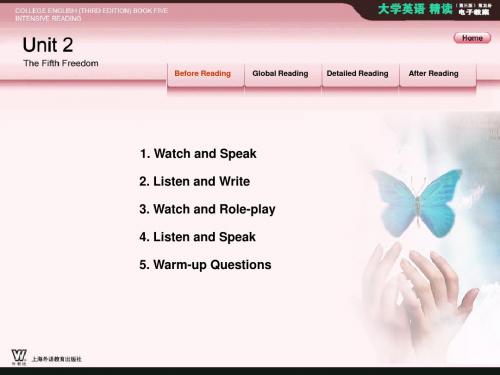
3-9
Before Reading
Global Reading
Detailed Reading
After Reading
Speech Directions: Divide the class into groups. Each group prepares a speech which includes: why people came to America; what are the freedoms Americans still cherish today; what the fifth freedom is.
Before Reading
Global Reading
Detailed Reading
After Reading
Listen and Speak 1. Who is Seymour St. John? He was the headmaster of the Choate School. 2. How old was he when he died? 94. 3. Did he die from a disease? No, he died in his sleep. 4. Who was his father? His father, George St. John, was headmaster from 1908 to 1947. 5. How long did he serve as headmaster? 26 years. 6. How long is the history of the Choate School? 110 years.
第二是在全世界任何地方,人人有以自己的方式来崇拜上帝的自由。
Before Reading
高英PPT
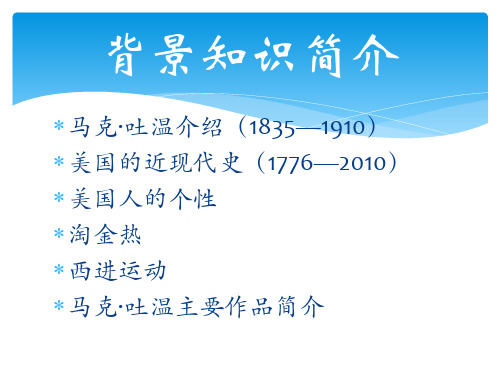
② 西进运动、领土扩张和两种社会制度矛盾发展激 化时期(1815——1860年)
西进运动在北美独立革命和南北战争之间的近百年内,具 有承上启下的重要作用。 从1803年路易斯安那地区的购买到1867年购买阿拉斯加地 区,在短短的几十年间,美国的领土从230万平方公里迅速 增加到930万平方公里,而付出的代价累计只有5,555万美 元。显然,美国经济大国的形成、自然条件的优越是同美 国的领土急剧扩张分不开的。 在美国西进运动和大陆扩张及早期工业化的过程中,逐步 形成了南北两种不同的社会经济制度。即北部的资本主义 工业和南部的种植园奴隶制农业。1820年的密苏里妥协案、 1833年和1850年的妥协案,1854年堪萨斯内战,以及1857 年的斯科特判例,都是南北两种力量斗争的反映。
影响:①积极方面西进运动对美国的政治、经济
生活都有重大的影响。广大的西部土地并入美国, 使美国成为幅员辽阔、自然资源丰富的国家;西部 的开拓,带动了大规模铁路的建筑和大批移民的流 人,使美国形成了广大的国内市场。②消极方面随 着西进运动的进行,大批印第安人遭到屠杀,幸存 者被强行赶到更为荒凉的“保留地”,他们的被迫 迁徙之路也被称为印第安人的“血泪之路”。
代表作品:《哈克贝利•
人物评价
*马克•吐温美国文学史上最知名
人士之一,被推崇为“美国文坛巨子”, 被誉为文学史上的林肯,是美国乡土文 学的集大成者。 海伦•凯勒“我喜欢马克•吐温——谁 会不喜欢他呢?即使是上帝,亦会钟 爱他,赋予其智慧,并于其心灵里绘 画出一道爱与信仰的彩虹。” 威廉•福克纳称他为“第一位真正的 美国作家,我们都是继承他而来”。 海明威曾经说过“一切当代美国文学 都起源于马克•吐温一本叫《哈克贝 里•费恩历险记》的书”。
Unit-高级英语第2册 PPT

References:
Correct spelling of words; Correct pronunciation of words; Word division; Parts of speech (noun, verb, etc.); Definition/meaning of words; Etymology (the origin and changes of words); Usage of words (with introduction and examples); Illustration of things (pictures after words); Synonyms and antonyms; Information about history, culture, etc.
new dictionary had been made for decades
before a group of London booksellers contracted
Johnson in June 1746 to
Section 1: Warm Up
Lead-in
Background Information
the English language, was prepared by Samuel
Johnson and published on April 15, 1755. The
dictionary responded to a widely felt need for
stability in the language. Calls and proposals for a
…
Lead-in
Background Information
高英第五册unit10部分ppt
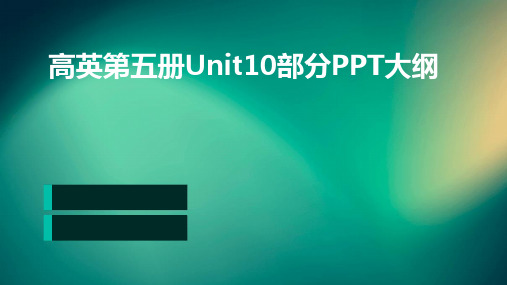
3
检查和修改
检查摘要是否准确、简洁、连贯,是否符合原文 的意图和风格,并进行必要的修改。
议论文结构搭建和论点论证方法
确定论点和分论点
明确文章的中心论点,并列出支持中心论点的分 论点。
搭建结构框架
合理安排文章的结构,包括引言、正文和结论部 分,确保逻辑清晰、条理分明。
论证方法
运用事实、例证、对比等方法对分论点进行论证, 增强文章的说服力。
反义词拓展
单词1、反义词1;单词2、 反义词2
相关词汇链接
与主题相关的其他重要词 汇
03 语法结构分析与运用
复杂句型结构剖析
并列句与复合句
分析句子结构,识别并列连词和 从属连词,理解句子间的逻辑关
系。
省略句与倒装句
探讨省略现象,如省略主语、谓语 等,以及倒装句的结构和用法。
强调句与否定句
分析强调句型的结构,如使用助动 词do、使用强调句型It is/was...that等,以及否定句的表达 方式。
高英第五册Unit10部分PPT大纲
目录
• 课文背景及作者简介 • 词汇短语解析与拓展 • 语法结构分析与运用 • 课文内容详解与讨论 • 阅读理解技巧指导与练习 • 写作技能提升与实践
01 课文背景及作者简介
时代背景与文学流派
时代背景
本文选自高英第五册Unit10,所处 的时代背景是20世纪中叶,当时社 会正处于快速发展和变革之中。
创作动机与影响意义
创作动机
作者创作本文的动机主要是表达对当时社会的思考和批判,同时通过文学形式 传达自己的情感和思想。
影响意义
本文作为现代主义文学的代表作品之一,对当时的文学界和社会产生了深远的 影响,也为后来的文学创作提供了重要的借鉴和启示。
高英PPT

Beijing love story
青春的脸,发旧的照片,都被命运定格在那一瞬间。 <北爱》,一个以青春开始,以现实结束的故事,充满无奈和伤感..........
杨紫曦,a gold-digger 拜金女 为了一个有钱的花花公子,甩掉了 对她超级体贴的大学男朋友。 She ditches her super-sweet boyfriend for a rich playboy. 伍媚,性感妩媚的公司中高层管理 者:a charming and sexy senoir manager. 吴狄的顶头上司:Wu Di's direct superior. 被吴狄的真诚所吸引:attractd by Wu Di's sincerity.
串起你我印象深刻的点滴:他们、 她们
林夏,觉得程峰花心,但待她 却与众不同。
Although she knows that Cheng Feng is unfaithful,she feels that he treats her in a special way.
沈冰,出生于云南一个小山村
She comes from a villiage in Yunnan province. 是个纯洁又坚强的女孩:She is a pure and strong-hearted girl. 程峰对她一见钟情:Cheng Feng falls in love with her at first sight.
这条路我们走得太匆忙,来不 及等不及回头欣赏,木兰香遮 不住伤。
• 有情人天各一方,终未能成眷属。
《宫》
“峰幂恋”修成正果,穿越时空在一起
• Happiness is not about being immortal nor having food or rights in one's hand.It's about having each tiny wish come ture,or having something to eat when you are hungry or having someone's love when you need love. • 幸福不是长生不老,不是大鱼大肉,不是权倾朝野.幸福是每 一个微笑愿望的达成,是当你想吃的时候有得吃,需要爱的时 候有人爱。
英语专业高英课程 Lesson 8 A ROSE FOR EMILY幻灯片共57页
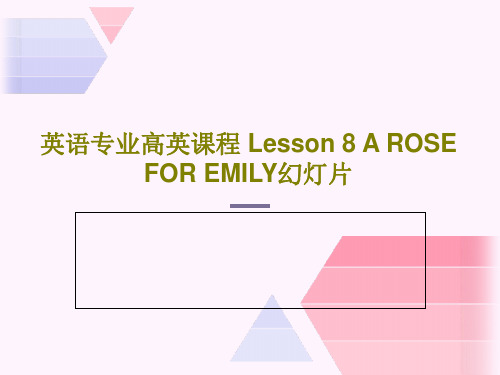
•
46、寓形宇内复几时,曷不委心任去 留。
•
47、采菊东篱下,悠然见南山。
•
48、啸傲东轩下,聊复得此生。
•
49、勤学如春起之苗,不见其增,日 有所长 。
•
50、环堵萧然,不蔽风日;短褐穿结 ,箪瓢 屡空, 晏如也 。
56、书不仅是生活,而且是现在、过 去和未 来文化 生活的 源泉。 ——库 法耶夫 57、生命不可能有两次,但许多人连一 次也不 善于度 过。— —吕凯 特 58、问渠哪得清如许,为有源头活水来 。—— 朱熹 59、我的努力求学没有得到别的好处, 只不过 是愈来 愈发觉 自己的 无知。 ——笛 卡儿
拉
60、生活的道路一旦选定,就
- 1、下载文档前请自行甄别文档内容的完整性,平台不提供额外的编辑、内容补充、找答案等附加服务。
- 2、"仅部分预览"的文档,不可在线预览部分如存在完整性等问题,可反馈申请退款(可完整预览的文档不适用该条件!)。
- 3、如文档侵犯您的权益,请联系客服反馈,我们会尽快为您处理(人工客服工作时间:9:00-18:30)。
Freedom Riders were civil rights activists who rode interstate buses into the segregated southern United States in 1961 and following years to challenge the nonenforcement of the United States Supreme Court decisions Irene Morgan v. Commonwealth of Virginia (1946) and Boynton v. Virginia (1960),which ruled that segregated public buses were unconstitutional.
1958 Wichita and Oklahoma City sit-ins
The second organized lunch-counter sit-in for the purpose of integrating segregated establishments began in July 1958 in Wichita, Kansas, at Dockum Drugs, a store in the old Rexall chain. In early August, the drugstore became integrated. A few weeks later on August 19, 1958, in Oklahoma City, a nationally recognized sit-in at the Katz Drug Store lunch counter occurred. The Oklahoma City Sit-in Movement was led by NAACP Youth Council leader Clara Luper, a local high school teacher, and young local students, including Luper's eightyear old daughter, who suggested the sit-in be held. The group quickly desegregated the Katz Drug Store lunch counters. It took several more years, but she and the students, using the tactic, integrated all of Oklahoma City's eating establishments.
Three major campaigns of civil resistance
African-American Civil Rights Movement
The African-American Civil Rights Movement encompasse s social movements in the United States whose goal was to end racial segregation and discrimination against bl ack Americans and enforce constitutional voting rights to them. This article covers the phase of the movement between 1954 and 1968, particularly in the South.
1960 Greensboro and Nashville sit-ins
Following the Oklahoma City sit-ins, the tactic of non-violent student sit-ins spread. The Greensboro sit-ins at a Woolworth's in Greensboro, North Carolina, on February 1, 1960, launched a wave of anti-segregation sit-ins across the South and opened a national awareness of the depth of segregation in the nation.[9]Within weeks, sit-in campaigns had begun in nearly a dozen cities, primarily targeting Woolworth's and S. H. Kress and other stores of other national chains.[10] The largest and best-organized of these campaigns were the Nashville sit-ins, whose groundwork was already underway. They involved hundreds of participants, and led to the successful desegregation of Nashville lunch counters.[11] Most of the participants in the Nashville sit-ins were college students, and many, such asDiane Nash, James Bevel, Bernard Lafayette, and C. T. Vivian, went on to lead, strategize, and direct almost every aspect of the nation's civil rights movement in the 1960s. The students of the historically black colleges and universities in the city played a critical role in implementing the Nashville sitins.
A sit-in or sit-down is a form of direct action that involves one or more people occupying an area for a protest, often to promote political, social, or economic change.
In sit-ins, protesters usually seat themselves at a strategic location (inside a restaurant, in a street to block it, in a government or corporate office, and so on). They remain until they are evicted, usually by force, or arrested, or until their requests have been met. Sit-ins have historically been a highly successful form of protest because they cause disruption that draws attention to the protest and by proxy the protesters' cause. They are a nonviolent way to effectually shut down an area or business. The forced removal of protesters, and sometimes the use of violence against them, often arouses sympathy from the public, increasing the chances of the demonstrators reaching their audience. Sit-ins were an integral part of the nonviolent strategy of civil disobedience and mass protests that eventually led to passage of the Civil Rights Act of 1964which ended legallysanctioned racial segregation in the United States and also passage of the Voting Rights Act of 1965 that struck down many racially-motivated barriers used to deny voting rights to non-whites.
1957 Durham,
North Carolina,
sit-in
1958 Wichita and
Oklahoma City sit-
ins
1960 Greensboro
and Nashville sit-
ins
1957 Durham, North Carolina, sit-in
In one of the earliest sit-ins of the American Civil Rights Movement, the "Royal Seven", a group of three women and four men from Durham, North Carolina, sat in at the Royal Ice Cream Parlor on June 23, 1957, to protest practices of segregation.[7] The activists were arrested and charged with trespassing. Their efforts are now recognized via historical markers in Durham. They went to court three times; each case ended in their being found guilty.
